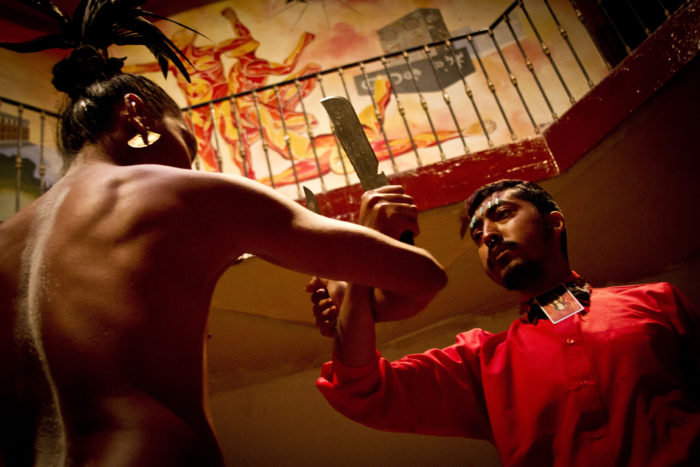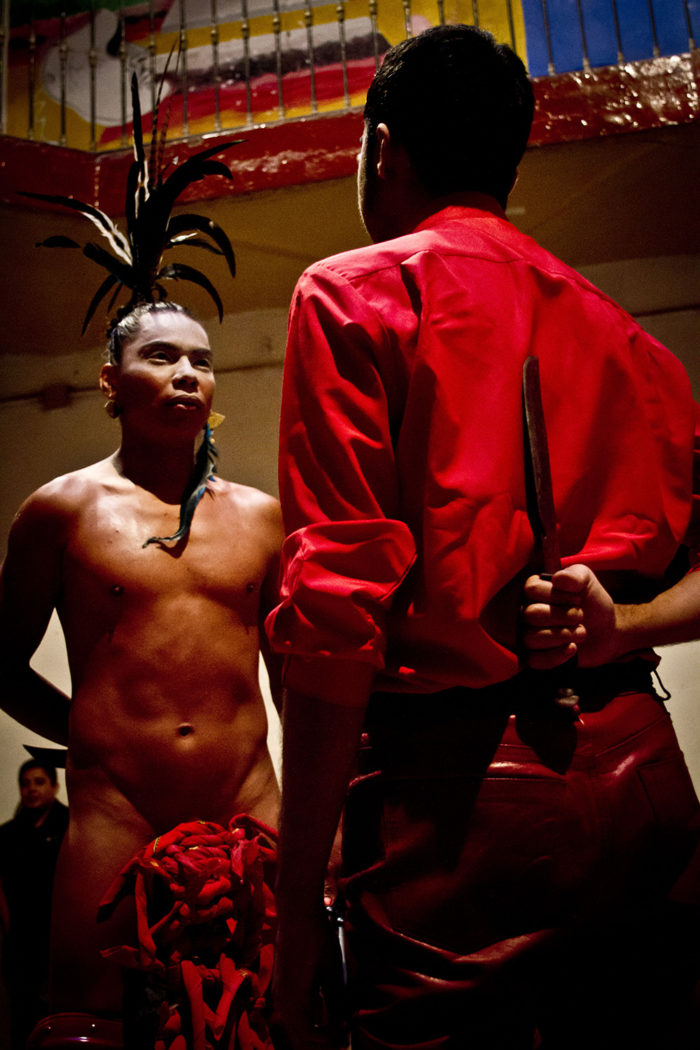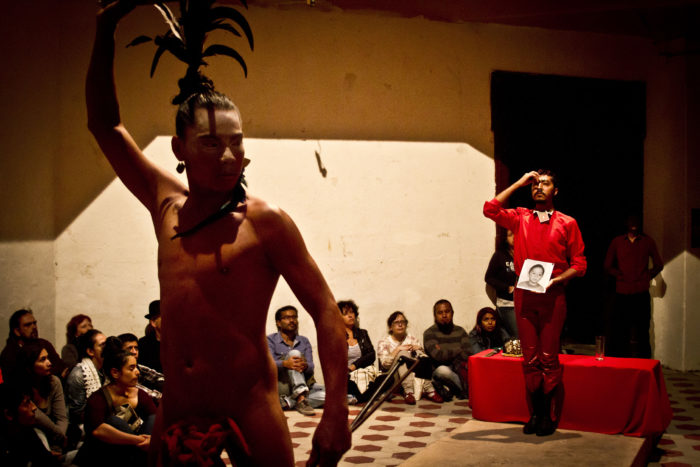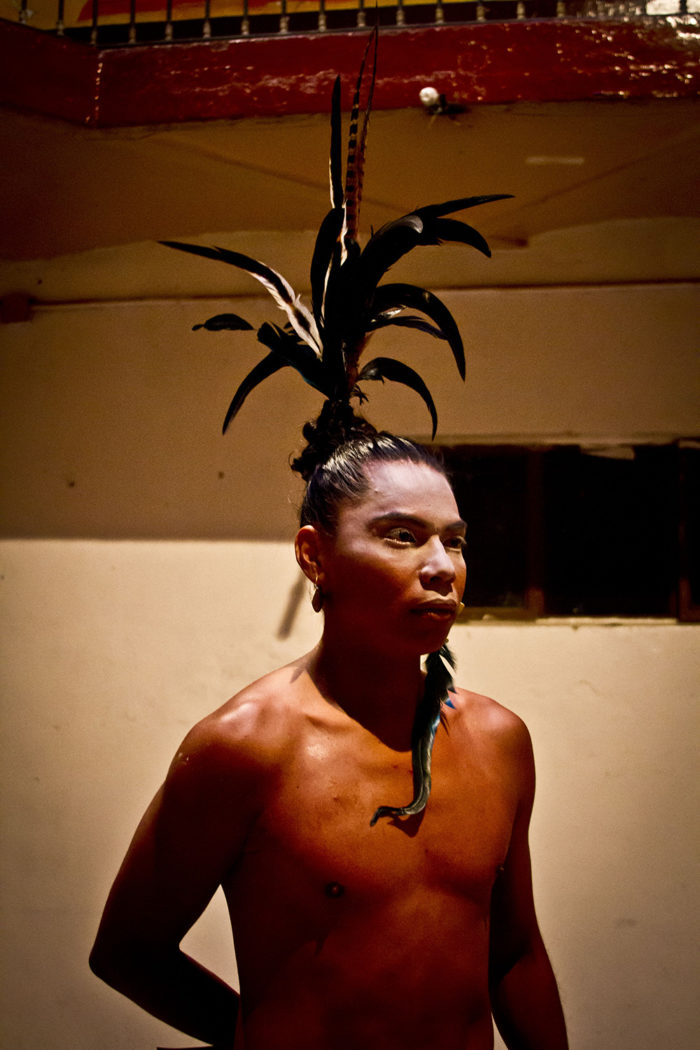Felipe Osornio Lechedevirgen Trimegisto, Lukas Avendaño
Reading time: 13 minutes

11.06.2018
A collaboration between the artists Lukas Avendaño and Felipe Osornio who visually unfold poetry and prose to question the subversive body.

Felipe Osornio (Queretaro, 1991), also known as Lechedevirgen Trimegisto, and Lukas Avendaño (Oaxaca, 1977) are two performance artists whose work interrogates the categories of race, class, and gender from the positions of intersectional and subaltern figures in order to problematize the power structures that exercise systemic violence and oppression against minorities in Mexico, a country plagued by discrimination, misogyny, murder, and hate.
Based on their contributions in the fields of writing and performance, Osornio and Avendaño have been recognized as key figures in the alternative Latin American discourse that generated the decolonial and geopolitical shift from queer to cuir, [2] demonstrating the impossibility of translating and implementing first world Queer Theory in Central and South America. The importance of this shift, along with the work of feminism, is tangible in the critical vision of Latino artists who understand the body as a battleground, combining their defiant artistic practice with committed activism.
In 2012, Lechedevirgen wrote “Pensamiento Puñal,” introducing the figure of the puñal [3] (a pejorative synonym of the term homosexual in Mexico) as a tool that could be used to refine strategies for empowerment and help rethink alliances and collectives. The text was taken up by Avendaño in 2013 for his performance No soy persona. Soy mariposa and since then the two artists have hosted workshops and performances together (“Amarranavajas,” 2014).
Five years since they first met, Lechedevirgen and Avendaño have prepared two texts for this issue of Terremoto. Although written independently, these texts are an extension of the discursive threads that identify the artists’ individual practices while also serving as a meeting point for their collaborations.

“No One’s Body” written by Avendaño, evokes the eternal pilgrimage of monarch butterflies, whose nomadic exercise of titanic proportions, provides a perfect metaphor for the migrant, an individual who finds itself everywhere and nowhere at once. Avedaño´s muxe background frames their work, muxeidad being understood as a space for subversive political agency that is reflected in their writing.
The transformative and revelatory nature of the butterfly helps deconstruct subjectivities and imaginaries, since the butterfly, like muxeidad, does not need a birth certificate, a passport, a visa, or citizenship to move across spatial and political borders. It reminds us of the unalienable right to move freely across the planet, regardless of the exercise of affects and sexuality.
Meanwhile, in “Marrow, or Against the Surface of the World,” Lechedevirgen questions the superficiality of contemporary sexually-dissident/revolutionary positions, setting out the urgent need to develop a deep awareness of life and death. The artist wrote the text based on his experience of living with chronic kidney failure for ten years before receiving a transplant that allowed him to live without the illness.
It is necessary to think from the body in order to see the mechanisms operating on it that in turn construct systems of control and discipline, but more important still is the need to develop a sense of preservation and empathy that helps stop the destructive cycles we participate in daily. This consciousness is essential for all revolutionary movements.
Both texts presented here reflect on radical possibilities of reimagining the world.
–
[1] Note: Amarranavajas is a colloquial word in Mexico to name the mischief-maker.
[2] Sayak Valencia, “Del Queer al Cuir: ostranénie geopolítica y epistémica desde el sur g-loca”, 2014, available in https://es.scribd.com/document/243461964/SAYAK-Del-Queer-Al-Cuir
[3] Translator’s note: Puñal translates literally as dagger.
[4] Translator’s note: Muxe is a Zapotec word that refers to a third gender identity in the Isthmus of Tehuantepec, in southern Oaxaca. Muxes are assigned male at birth but raised as women or as a feminine third gender that exceeds the gender binary.

No One’s Body
Lukas Avendaño / tr. Kit Schluter
The migration is beautiful. Four years ago I didn’t think this phrase would appear in my life, and now, in those of many others.
Every body is a migrant, migrant of bodies!, as much in their quality of being resuscitated, reincarnated, emancipated, transformed as in the inhalation and exhalation of every moment—every instant—that we are in transit; only the David remains still, and even then his marble erodes, wears down, oxidizes… We insignificant mortals, insignificant because there is no possibility of being a signifier, which removes any possibility of signifying, of the signified.
The impossibility of being a sign and the dichotomic relationship between the signifier and the Saussurean signified [1]. Perhaps the affirmation of recognizing myself as the “less than less than no one” derives unconsciously from this, since perhaps in this understanding, this hunch, the “no one” is already a “someone,” a signifier that, when it turns to “no one,” carries its meanings implicitly; hence the possibility that even in the inauguration of the “no one,” it can become someone. Not so when the no one is a “less than less than no one;” a random game in the relation to the negation of the negation of the negation, as states one of the dialectic’s fundamental laws.
And in this way of utopian being—not being—the body enunciates itself; through this, one is revealed to be a great example of failure, because he has never tried to be the fastest, the strongest, the tallest, or the smartest . . . the most “INTELLIGENT;” it is clear that in being negated one does not cease to be, because if one is really absent, who is instantiating the absence? Nobody would notice one’s existence, not even as an absence, as in the case of the “less than less than no one;” the commoner recognizes the “no one,” but not the “less than less than no one,” because even “Sir No One” has a noble title, is a “Sir,” a “Lady,” and to have that in the Land of No Ones is rather very quite.
From there derives the impulse, the strength, the motivation, the sting, the stimulus, the pulse of every gesture, mark, and phoneme in its form of enunciation or writing that today attempts to sketch out the “migrant body” of one who has MIGRATED; a DO that will never be a Re, Mi, Fa, Sol, La, Si, and only returns to the beginning of the end; the Do, a being that does not want to be No One and, were he even to try, would not succeed, but who does try to exist so that the “less than less than nobody” may come into existence; like the existence of black so white may contrast it, like silence that lets sound be sound . . . like the bud that allows for the flower; like condensation, the vapor that will be a cloud, mist, rain…
“Migration is beautiful” said the stencil on some old wall on some old street in Los Angeles, California, which the “less than less than no one” met in his step, in his being, on his way, on his path, on his lane, in his desire to walk unperceived, even though he didn’t exist as such.

And he said, “Of course the impossibility of being someone exists! But not the impossibility of being a butterfly; because the butterfly isn’t anyone; the butterfly is just that, a butterfly,” and then the “less than less than nobody” formulated, named, and abandoned all his finitude in the infinitude of a butterfly’s being. Nobody could take that quality of being away from it, unlike the someone who finds himself constantly exposed to ceasing to be. Hence his mad race for accumulation, he refuses to stop being someone, accumulates more in order to always be someone and tries to negate himself only in order to be someone other than someone in life, even though he thinks of this entirely, and less in the life that is reaching its finitude.
Because the butterfly being will never have to say how many pairs of pants it has in its closet, even if it had only one it will always be more before the absence of unity.
Like when someone says, “You travel a lot, true?” and the “less than less than no one” pauses before a “compared to whom?” To the President of Mexico? To the President of the USA? Relative to the second largest migration of insects on the American continent, the monarch butterflies? Or in relation to the person formulating the criterion of truth “you travel a lot”?
The “criterion of truth” is only valid when, and only to the extent that we agree on its temporality and spatiality; hence the importance that “less than less than no one” be moving from the center of the sight, forcing the sniper to reconsider all the possibilities of hitting the target, to adjust the sight, consider the windspeed, elevation, range, reposition the vector before it hits; and the “less than less than no one” is evidence of the possibility of faking on the target.
That is why the “less than less than nobody” exists, not to negate the other, not to falsify the other’s truth, not to tell others that their truth isn’t true just because it isn’t false, but so others may consider the possibility that their truth, if not false, always contains the possibility of not being true.
Case number one.
Chicano: Fuck you paisa [2], Fuck you paisa, Fuck you paisa…
Less than Less than No One: You’ll never be a gringo!
Case number two
Chilango [3]: But you’re not from Mexico City [4]!
Less than Less than No One: We all arrived here at some point…
Case number three.
(—?): When did you realize that you were muxe [5]?
Less than Less than No One: With all due respect, at what point did you not have in mind that you were a man, a woman, from the mountains or the coast, an American, an earthling? Because I have never stopped thinking about what I am, until you came and told me what I was.
–
[1] Ferdinand de Saussure, Curso de Lingüística General. Editorial Lozada (Buenos Aires Argentina, 1945).
[2] Translator’s note: Paisa. A pejorative term used by assimilated Mexican-American populations to discriminate against recently arrived immigrants or longterm immigrants who have not assimilated.
[3] Translator’s note: Person from Mexico City.
[4] Alluding to the feeling of legitimacy possessed by those born in the formerly-named Distrito Federal (Federal District), now called Ciudad de México/CDMX (Mexico City).
[5] Translator’s note: Muxe. In Zapotec cultures, the muxe is an individual assigned male at birth, but who embodies traits often associated with the female gender. It is often discussed as a separate, third gender.


Marrow, or Against the Surface of the World
Lechedevirgen Trimegisto / tr. Kit Schluter
What good is dissidence? What good is rebellion?
Why crush our eyes, looking at dry roses,
while the world swells on in suffering’s endless quiet?
While its skin breaks and its nerves stretch out in an
unconscious swamp?
The world ended a while ago now.
Today, reality tears out your eyes if you look at it,
like a fist of light leaving your rectum,
tearing out your sun-thirsty guts, inhaling,
leaving you alone, bleeding love.
Feminism. First-wave Feminism. Second-wave. Egalitarian Feminism. Feminism of Difference. Anti-pornographic Feminism. Pro-sex Feminism. White Feminism, Black Feminism, and Yellow Feminism. Feminism of Color. Fluorescent Green Feminism. Hot Pink Feminism and Violet Feminism. Feminism of Colors. Chicano Feminism. Environmental Feminism. Anti-specist Feminism. Anticapitalist Feminism. Beyonce’s Feminism. Pro-abortion Feminism. Catholic Feminism. Prosex work Feminism. Abolitionist Feminism. Fat Feminism. Cyborg Feminism. Punk Feminism. Postpunk Feminism. Cyberpunk Feminism. Steampunk Feminism. Postfeminism. Anarchofeminism. Transfeminism.
Activism. Artivism. Hacktivism. Clickactivism. Crack-tivism.
Intersex. Ecosex. Chemsex.
Hero. Heroin/e. Cocaine.
Heteropatriarcal. Heteronormative. Homonormative. Transnormative.
LGBTTTIQXYZ3.1416
Homosexual. Bisexual. Pansexual. Transexual. Transvestite. Transgender. Cisgender. Fluid Gender.
Gender theory. Inventing gender. Undoing gender. Putting gender in a box.
Body. Bodye. Bawdy. Bawdee. Botty.
Queer with Q. Cuir with C. Kweer with K.
Writing with they. Writing with ze.
We’re revolutionizing the world.
The world is burning, but we’re revolutionizing the world.
Marching on rubble,
Dancing on tombs.
Revolutionizing ashes.
Are we revolutionizing the world?

We’ve lost our way, as Guy Hocquenghem warned when he saw homosexuals domesticated, as Paco Vidarte reiterated to the gays lacking ethics, and as Lemebel said when he spoke for his difference.
Faces tattooed with the future, their pupils empty of the present.
Even if they’re covered with the rainbow they still reproduce the same logic of hatred.
Even though they are against violence and death they look out for their own lives.
We’ve all inherited the world. What’s the point of fighting if you can’t fight every fight? In the game of cruelty we’re all the enemy in someone else’s fight. Alliances don’t last; what lasts is pain, and what hurts is accepting that this life is only borrowed, and that all souls are going to disappear.
Separated by difference, united by hate, we forget that we’re all the same lymph and cartilage. A bullet in my chest is a bullet in yours.
And in 100 years, no one who’s here will be here anymore.
And it’s raining fire while we write our manifestos.
Living fast when there’s hardly any time to live.
Saving the world on the outside, killing the one on the inside.
We are acid. We have blood, but prefer poison. An umbilical cord turning into serum.
We live apart from ourselves. Our understanding of ourselves is founded on corpses, lifeless, cleaved-open bodies. We understand the living based on the dead.
We are time bombs. We plant pesticide and harvest carcinoma. An esophagus turning into a probe.
We are cells connected to each other in infinite communication, which form a single tissue. A single Organism. But we follow the logic of cancer. Dividing and propagating. Killing and dying. If you’re not with me, you’re my enemy.
Torture, kidnapping, trafficking, executions, war, rape, feminicide, misogyny, machismo, homophobia, transphobia, persecution, toxic gases, nuclear reactors, oil and forest fires, hunting, logging, extinction. Symptoms of the same disease in its terminal stage. We spread across land and air, our nerves are the earth’s. We tread on its skin, and breath in its lungs.
But its birds drown and its fish desiccate. Its mossy stomach gives birth to dead fetuses and its skies are intestines and viscera.
We hurt her. We hurt her deeply, with the hurt of something inevitable. She scars with rings of opal, fluorite, and topaz. Quartz hemorrhage. Emerald hematuria. Her eyes cry tourmaline while her zirconium skeleton sustains all our births and autopsies. Open like a geode, her heart spills out all the world’s salt. Compassionate and still, she peers at us in silence and watches as we wreck her internal organs. We are bodies of mud in the primordial soup. We ignore the voice at her core while we suck her dry.
To enter the marrow is to touch her and have your arm ripped off. To convulse in a waterfall of blood. To see the shine leaving a gaze with no tomorrow. To see organs and tissues instead of people. Circulatory systems and solar systems. Blue and red circulation. Electric pulses, vertebrae and pleurae. Ribs, clavicles, and cranial nerves. It’s to see flora and fauna evaporating and fermenting. It’s to see illnesses before they manifest. It’s to see the origins of contagion and the spreading of fevers. It’s to see infections and gangrene. It’s to see necrosis and tumors taking shape. It’s to see toxins and substances invading entire futures.
But it’s also to see DNA dancing and molecules bearing the strongest desire to continue pulsing. It’s to see neurons vibrating together, carrying the most precious memories. It’s to see adrenaline transforming itself into the wetness of your kisses and your serotonin converting your saliva into pleasure. It’s to see how fast red blood cells flow to spread heat to your limbs. It’s to see how your solar plexus radiates with the entire intensity of the universe and see your canals join mine.
To reach the marrow is to see the pits open, but also close.
To reach the marrow is to achieve consciousness. It’s to feel the infinite joy of knowing that your cells are dying, the absolute happiness of knowing that your body is growing old, that your voice is softening and your teeth falling out, that you are becoming light and losing weight, the eternal pleasure of disappearing.
It’s to go on against the surface of the world.
It’s to not stop hearing the swan song.
It’s to celebrate even that you feel pain, because it means you can still feel.
It’s the torrent of absolute love that courses through you at every moment.
Because they aren’t the same thing, being alive and living.
Comments
There are no coments available.